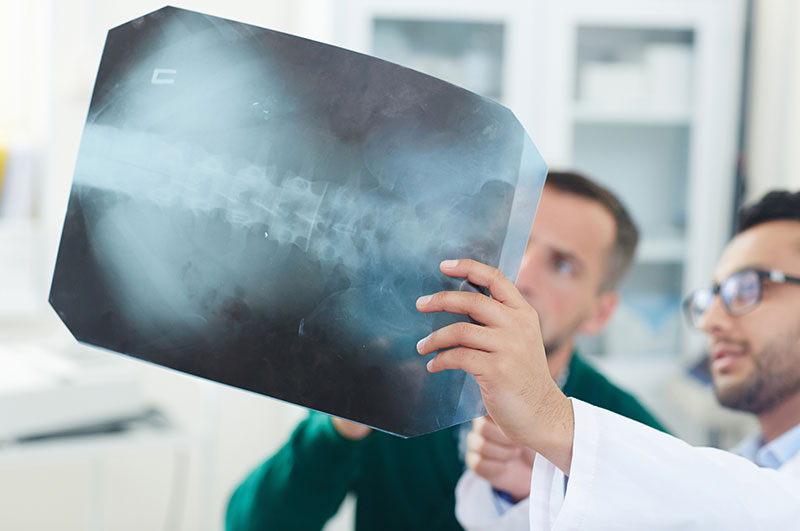
Radiology & X-Ray
X-rays are one of the quickest, most useful and most frequently utilized imaging studies. They are commonly used to detect fractures and dislocations in your extremities; pneumonia and tumors in your chest; kidney stones and bowel obstruction in your abdomen; and degenerating discs and scoliosis in your spine. Although they utilize ionizing radiation, the information gained far exceeds the small risk of radiation in the clinical situations in which they are used. The technologist will make sure that only the area of interest is x-rayed and other areas are screened as necessary.
Tests Included
- Sample Type: Blood & Urine
- HSA/FSA: Accepted
- Collection Method: In person at a Labcorp location
- Results: 1 day from when your sample arrives at our lab
Preparation: Fast for 12 hours (no food or drink, except water) before sample collection. If you’re taking a supplement containing biotin (also called vitamin B7 or B8, vitamin H, or coenzyme R), commonly found in products promoting nail, skin and hair health, it is recommended that you wait at least 72 hours from your last dose before sample collection.
For All CT Examinations
Previous related examinations (other CT, ultrasound, MRI, nuclear medicine, X-ray, or PET scan) are an important part of an accurate performance of CT scans and their interpretation by our radiologists. Please let SYNC Diagnostics staff know when and where any previous exams were done so we can obtain reports/films prior to your examination.
CT Abdomen And/Or CT Pelvis (With IV Contrast)
- We will need recent blood creatinine results.
- If you have had previous allergic reactions to IV iodinated contrast material or previous serious reaction to food or medicine, please inform SYNC Diagnostics staff prior to your appointment.
- The day before your CT appointment, please pick up barium; you will receive directions from SYNC Diagnostics staff.
- Do not eat or drink for two hours prior to CT examination.
CT Abdomen And/Or CT Pelvis (Without IV Contrast)
- The day before your CT appointment, please pick up barium; you will receive directions from SYNC Diagnostics staff.
- Do not eat or drink for two hours prior to CT examination.
CT Of Any Other Area (With IV Contrast)
- We will need recent blood creatinine results.
- If you have had previous allergic reactions to IV iodinated contrast material or previous serious reaction to food or medicine, please inform SYNC Diagnostics staff prior to your appointment.
- Do not eat or drink for two hours prior to CT examination.
CT Of Any Other Area (Without IV Contrast)
It is not necessary to fast prior to these CT exams.
CT Angiograms
- We will need recent blood creatinine results.
- If you have had previous allergic reactions to IV iodinated contrast material or previous serious reaction to food or medicine, please inform SYNC Diagnostics staff prior to your appointment.
- Do not eat or drink for two hours prior to CT examination.
CT Urogram
- We will need recent blood creatinine results.
- If you have had previous allergic reactions to IV iodinated contrast material or previous serious reaction to food or medicine, please inform SYNC Diagnostics staff prior to your appointment.
- Drink 32 oz. of water and hour and a half (1.5) hours prior to exam. You may urinate when necessary.
- Do not eat or drink for two hours prior to CT examination.
Examination time can range from 10 minutes to more than an hour, depending on the part of the body being examined and whether or not a contrast agent is used. For a head scan, you will be asked to remove eyeglasses, dentures, jewelry and barrettes or hairpins, as metal can interfere with the imaging. For a body scan, you may be asked to remove all clothing and put on a hospital gown.
The CT technologist will position you on the scanning table. If you are undergoing a head scan, the technologist will place your head in a cradle to help prevent movement. The technologist will guide the scanning table into the CT unit, which is a machine with a large circular hole in the center. The CT technologist will not be in the room during the scan, but will be able to see you and you will be able to communicate with the technologist through an intercom system.
As the X-ray tube rotates around you, you will hear a whirring sound. The exam table will move slightly to reposition you for each scan, but it moves so slowly that you might not even notice it. The technologist will tell you when each scan sequence is beginning and how long it will last. You should remain as still as possible during the sequence. For certain scans, you may be asked to hold your breath for a few seconds. Even the slightest movement can blur the image, so it is important to remain still.
When the exam is complete, your CT scans will be given to a radiologist.
- After the examination, a radiologic technologist will examine the images and transfer them to the radiologist for interpretation. The radiologist will then evaluate the images and create a report of the findings to your medical provider.
- Results are typically available within 2 to 4 hours..
- It is recommended that you schedule a follow-up appointment with your physician to discuss the results.